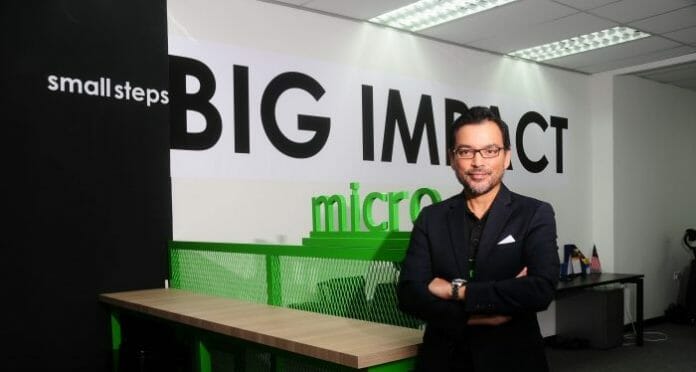
Malaysia’s Minister of Entrepreneur Development and Cooperatives, Wan Junaidi Bin Tuanku Jaafar has urged the Asia-Pacific Economic Cooperation (APEC) members to work together to promote and encourage the transition of the region’s micro, small and medium enterprises (MSMEs) along with the emerging digital economy.
While the government has announced an additional RM15 billion to the PERMAI package in January to help ease the burden of business owners along with the wage subsidy extension, not all businesses will be able to take advantage of this aid.
However amicable the government’s efforts are, a large-scale crisis such as Covid-19 requires the convergence of private entities as well to ensure MSMEs get all the financial help possible to weather the Covid-19 storm.
“It is crucial that vulnerable businesses get the help they need and hence, MicroLEAP is offering its support as a P2P financing platform. Provided the business is profitable and they can afford the financing, we are here to help MSMEs take that next step as the economy recovers in 2021,” says Tunku Danny Mudzaffar, Founder and Chief Executive Officer (CEO) of Malaysia’s first Conventional and Islamic Peer-to-Peer (P2P) microfinancing platform, MicroLEAP.
The financing option allow issuers to obtain anywhere between RM1,000 to RM50,000 in funding. As for basic requirements needed to obtain the said funding, a business would only need to be in operation for six months as opposed to the three years required of Malaysian banks.
Not to mention, MicroLEAP only requires fundamental documents as opposed to banks that require ample amounts just to apply for a loan. These qualms are eased by the platform, ensuring a smooth and efficient process in obtaining financing.
Realising a gap in financial literacy among young and new business owners, the platform also offers free on-demand online debt management and accounting training to better help them manage finances frugally during the current economic downturn.
“When it comes to cash flow and managing your accounts, financial literacy is key to ensure the survivability of your business. If you do not have a grip on your ins and outs, it is impossible for you to budget, save and know how much you require should you need to raise financing,” Tunku Danny says.
MSMEs And Malaysia’s Economy
The Prime Minister of Malaysia, Tan Sri Muhyiddin Yassin announced an economic stimulus package on June 5, 2020, known as the Economic Recovery Plan (PENJANA) valued at RM35 billion to stimulate the economy.
As part of the initiative, Putrajaya has approved 7,266 applications involving RM1.366 billion under the PENJANA’s MSMEs financing scheme as of March 19. The financing scheme, which has an RM2 billion allocation, prioritises MSMEs that have never received any bank financing previously.
However, MicroLEAP opines that some banks still have a strict, though slightly loosened, credit criteria resulting in many MSMEs failing to make the cut even though there has been a great deal of effort poured in by the government.
“With bank loans proving to be increasingly difficult to obtain, many small businesses are suffering and struggling to stay afloat. Therefore, the government should be channeling some of these funds to alternative financing platforms that are able to connect to underserved businesses that traditional banks are unable to,” he says.
According to the Department of Statistics Malaysia (DOSM), 98.5 percent business in the country are MSMEs and Selangor has the biggest percentage of MSMEs (19.8 percent).
Tunku Danny points out that MSMEs are a major employer and are integrated in many facets of the economy and, if they are allowed to fail, the failure will have a detrimental effect on consumption, employment and asset values.
“This group is also responsible for close to 40 percent of the country’s GDP, making it even more crucial for us to protect. Measures in place and the right amount of funding can also send the right message to foreign investors, instilling confidence in Malaysia’s governance through a solid support network for MSMEs,” he says.
The Securities Commision Malaysia (SC) has urged investors to be aware of the risks in investing and MicroLEAP states that retail investors are encouraged to limit their investments to RM50,000 per P2P platform at any one time.
“As with all P2P investing, diversification is key so that you spread the risk of default across as many investment notes as possible. If you have RM1,000 to invest, whatever you do, do not invest all your funds in one single note. Instead, spread those funds across as many notes as possible, for example across 5 – 10 notes,” Tunku Danny advises.
MicroLEAP’s Mitigation Efforts
“We cater to micro-enterprises predominantly, for example, your mak cik in Kuala Pilah that needs RM10,000 to buy more stock for her kedai runcit. Provided the business is profitable and they can afford the financing, we are here to help MSMEs take that next step as the economy recovers in 2021.
It is important as MSME owners are the backbone of our community and failing them can lead to detrimental economic impact,” Tunku Danny tells BusinessToday.
MicroLEAP has introduced psychometrics testing to assess the creditworthiness of borrowers which is an alternative credit-risk scoring tool.
“As the entities that we assist in raising P2P Financing are micro-enterprises, for example, a mak cik that needs RM10,000 for her kedai runcit, many of them may not have a detailed credit history to build a credit report through traditional methods.
“So, these micro-enterprises may find it difficult to get loans from a traditional financing institution such as a bank,” he points out.
MicroLEAP marries both alternative and traditional credit-risk scoring methods that feed into the proprietary credit algorithm to give a thorough picture of the ability for our Issuers to repay their financing.
The company also offers new initiatives like Islamic Car Dealer Financing and Islamic Invoice Financing.
“By offering new Islamic products for investors to invest in, secondhand car dealers and companies that are waiting 30 – 90 days before they get paid for an invoice may get access to very short-term and shariah-compliant financing.
This allows businesses another source of shariah-compliant financing that they may tap into. We are also expanding our issuer base to MSMEs, as the ticket sizes for our new products can go up to RM500,000,” he adds.
“The outbreak and resulting efforts to curb the spread of Covid-19 have adversely impacted many businesses. With this knowledge, we simply wish to expand our services to help MSMEs weather this storm in 2021 and beyond,” he concludes.








